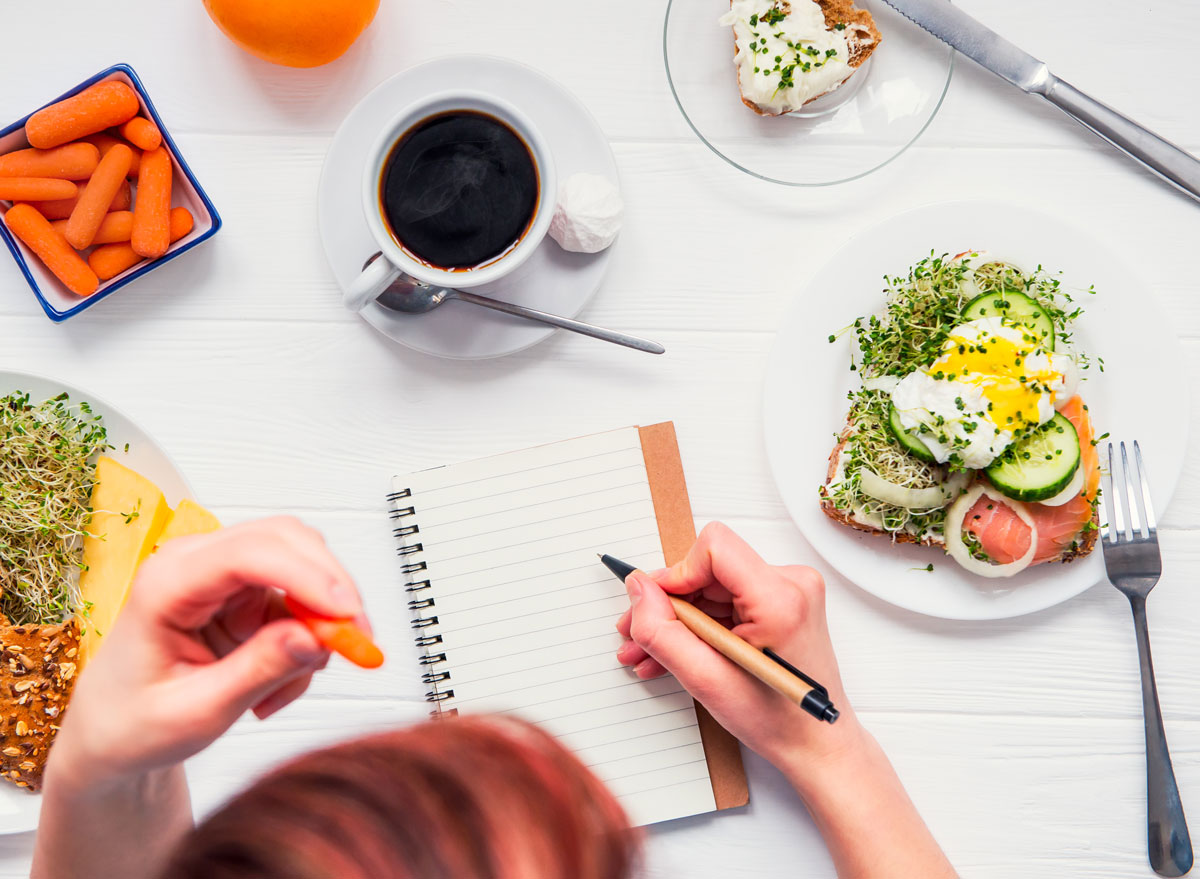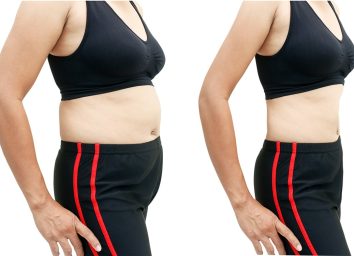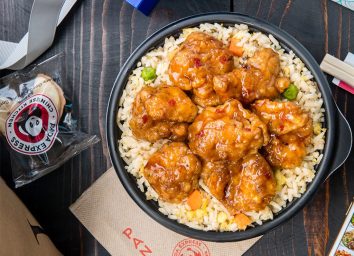The Expert Guide to Keeping a Food Journal for Effective Weight Loss

Adopting new eating habits can be a tough transition. From kicking your afternoon candy cravings to drinking less coffee, one of the most common tools that people can use to instill change in their diet is by using a food journal.
Whether you're trying to lose weight, working on improving mindless munching, or trying to be more cognizant of your food choices, a food journal can help.
Here's everything you need to know about food journaling, and tips for how to establish accountability and keep a healthy perspective when journaling.
What is a food journal?
"A food journal is a log that keeps track of meals, snacks, beverages, and all other food intakes," says Monica Auslander Moreno, MS, RD, LD/N, registered dietitian and nutrition consultant for RSP Nutrition. "It can be as vague or detailed as you'd like, and either you or a health professional can monitor it."
And food journaling doesn't have to be used for weight loss.
"It can be initiated for various reasons such as to find a food that is triggering a physical intolerance or allergic reaction; for weight loss or weight gain purposes; or to recognize any behavioral reactions to food additives or preservatives, for example," says Nancy Z. Farrell Allen, MS, RDN, FAND, registered dietitian nutritionist and spokesperson for the National Academy of Nutrition and Dietetics. "This is why everything should be recorded. A person's goal may be weight loss, but we may find out other helpful information through a food journal, too."
What are the benefits of keeping a food journal?
Food journals have been studied to be beneficial to help with weight loss.
A 2008 study published in the American Journal of Preventive Medicine of 1,700 participants found that keeping a food diary can double a person's weight loss. And when 142 participants spent an average of about 15 minutes each day journaling over 6 months, an Obesity study found that they lost the most bodyweight.
Besides weight loss, there are other benefits of tracking your eating behaviors, particularly to help you recognize unhealthy eating patterns.
"Tracking food can provide a level of consciousness and great data to tease out intake patterns over time, especially as food intake relates to certain times / emotional states," says Auslander Moreno. "It can be supportive (if followed by a healthcare professional) and motivating/provide accountability over time."
Is keeping a food journal healthy?
"For someone who really could use enhanced awareness, cognition, and a reality check surrounding food, food journals are great," says Auslander Moreno. "They're great as long as they do not cause distress or harm. Dietitian input and feedback on journals can redirect unhealthy thoughts and behaviors surrounding food into positive ones. Conducting journaling independently may not be the best idea for many people."
Of course, food journaling comes down to how you approach it.
"Unfortunately, a food journal can be used as a weapon or a tool," says Susan Albers-Bowling, PsyD, a psychologist at the Cleveland Clinic and The New York Times bestselling author of Hanger Management. "It's a helpful tool when you approach it with an attitude of non-judgment. This isn't an evaluation of yourself. It's simply the facts. Sometimes people stress about them or are afraid to write things down. If you are going to keep one, commit to leaving your inner critic out of it. Look at is like conducting an experiment and you are gathering helpful data."
It's all about flexibility. "Food journals sometimes lead people into becoming rigid instead of just aware," says Dr. Albers-Bowling.
Who should skip food journaling?
Keeping a food journal isn't right for everyone. "People who struggle with OCD and/or eating disorders often struggle with food journals," says Dr. Albers-Bowling. "They obsess over every detail and become mentally consumed by the numbers."
"If this sounds like you, it's important to step away from that tool and find another one that might be helpful. Food journals can be detrimental and dangerous when they trigger more eating disorder behaviors/thoughts," she says.
What is the best way to keep a food journal?
It comes down to personal preference and finding the tool that you can remain consistent with.
"A food journal can be logged 'as you go' or filled out at the end of the day," says Auslander-Moreno.
That could mean a paper journal or another electronic tool.
"The best is to make your own version that is going to tailor to your needs and that you will really stick to," says Dr. Albers-Bowling. "It can be as simple as a thumbs up or down to several columns, or one that focuses on being mindful of your behavior and feelings."
Apps are great tools. Here are some of Dr. Albers-Bowling's favorite apps for food tracking:
- Rise Up + Recover: this app helps you to focus more on feelings than food amounts or calories.
- Calm: this app can help you relax and reduce emotional eating.
- Ate Food Diary: this app helps you keep a mindful food diary.
- MyFitnessPal: "Normal" eaters often like this app to track their food.
Here are 8 tips to keep in mind while food journaling.
Ready to get started? Keep these tips to keep a food journal in mind when you're starting off.
- Try to track your mood/emotions surrounding the meals. Take note of different patterns that come up with your meals/snacks and why they are meaningful," says Auslander-Moreno.
- Focus on tracking your internal cues. "Are you eating when you are really physically hungry? Are you satisfied by what you ate? Were there any feelings that prompted it Focus more on HOW you eat than the specific minute details of calories and fat grams," says Dr. Albers-Bowling.
- Keep it short. "It's not a dissertation! You can also keep a bullet journal to save time. Just a few notes here and there goes a long way," says Dr. Albers-Bowling.
- Track your hunger/fullness. "Evaluate your hunger and fullness, and employ a tool like the Hunger Fullness Scale," says Auslander-Moreno.
- Don't forget to track beverages. Water, coffee, tea, and smoothies all count. "Hydration is important, and liquids count!" says Auslander-Moreno.
- Snap a photo. "A photo can go a long way to help raise your awareness quickly without leading you to obsess over numbers. Just pausing to take the picture makes you think, 'Do I really want that or not?'," says Dr. Albers-Bowling.
- Be honest. "The only tip I tell my patients is to be honest with your food intake entries and portion sizes; because if everything looks 'perfect', then I will have a limited amount of suggestions for change and this inadvertently sends us down the wrong path to healing," says Farrell Allen.
- Invest in a dietitian. "A dietitian can help monitor your intake and provide supportive and helpful feedback," says Auslander Moreno.
The bottom line: "Food journals help us document and gather data. This is helpful when our feelings override our logic," says Dr. Albers-Bowling. "There is no right or wrong way to keep one. Do what works for you."








